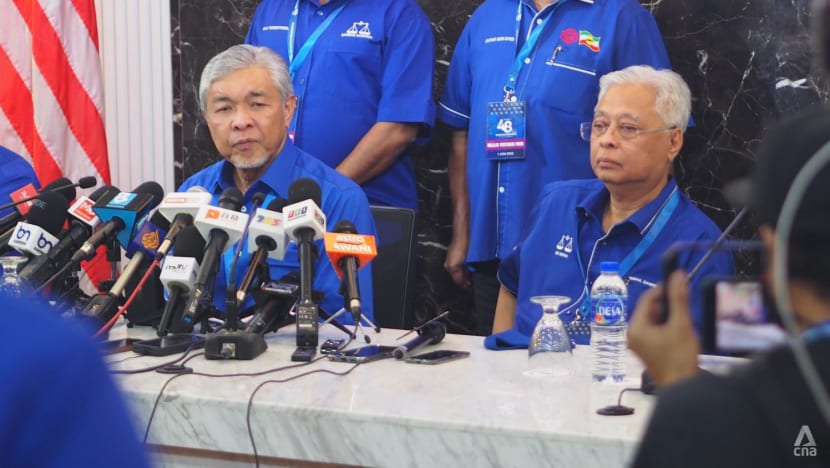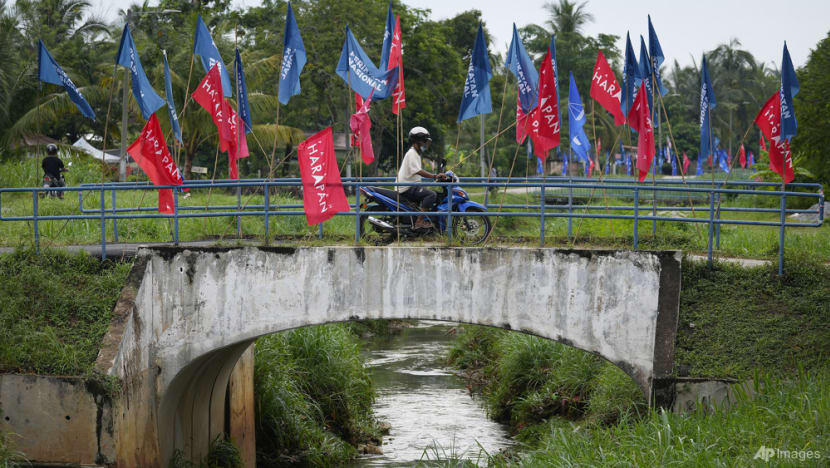Commentary: By not rushing Malaysia election, Ismail Sabri charts his own course
Malaysian Prime Minister Ismail Sabri Yaakob appears to be holding his own, despite pressure from his UMNO party colleagues to hold a general election soon, says this academic.

United Malays National Organisation president Ahmad Zahid Hamidi (left) and the party's vice president Ismail Sabri Yaakob, who is also Malaysia's prime minister, speaking to reporters after Barisan Nasional convention on Jun 1, 2022. (Photo: CNA/Rashvinjeet S Bedi)
SINGAPORE: In a recent interview at the Nikkei’s Future of Asia conference, Malaysia’s Prime Minister Ismail Sabri Yaakob said that the country “will have to wait for the right time” for a general election. He cited the inflated cost of living, rising food prices, and uncertainties resulting from the Ukraine war as the key reasons. Malaysia must hold the 15th General Election (GE15) before September 2023.
This is the first time Ismail Sabri has articulated his views unequivocally about the election timing. The prime minister risks estranging his party, the United Malays National Organization (UMNO), especially after its president Ahmad Zahid Hamidi and deputy president Mohamad Hassan had previously urged him to call an election as soon as possible.
Ismail Sabri still needs to convince the UMNO grassroots for delaying it. But if he can weather a potential mutiny, it will only boost his image as an independent-minded leader.
DIFFERENT PREFERENCES IN TIMING OF GENERAL ELECTION
The differences in views between Ismail Sabri and Ahmad Zahid are worth noting. Delaying the polls will allow Ismail Sabri to retain a raft of options to keep the premiership, whether with UMNO or without. The latter is keen on holding the polls soon to capitalise on UMNO’s growing political fortunes.
In 2018, UMNO lost power for the first time in the country’s history but regained power by joining the Perikatan Nasional (PN) coalition headed by Muhyiddin Yassin in March 2020. Ismail Sabri became prime minister in August 2021 due to some UMNO leaders shifting their allegiance from Muhyiddin Yassin to him.
However, Ismail Sabri did not become the UMNO president. In the past, Malaysian prime ministers also held the party’s presidency.
During the UMNO general assembly in March, delegates agreed that the party polls be postponed after the general election. The UMNO polls were supposed to be held this year.
This could have set the stage for Ismail to potentially seize the party leadership by defeating the incumbent Ahmad Zahid. With the postponement, Ahmad Zahid will continue helming UMNO into GE15.

Some UMNO leaders agree with Ahmad Zahid’s and Mohamad Hassan’s stance — to expedite the general election, then have the party polls thereafter — especially when UMNO has gained significant momentum to regain Putrajaya. UMNO won the recent Malacca and Johor state elections by securing the bulk of the seats. In December, its ally in Sarawak, the Gabungan Parti Sarawak (GPS) also won big at the state election, almost wiping out the opposition.
Bringing forward the election also means Ahmad Zahid and former prime minister Najib Razak can still be the prime movers directing UMNO in any new ruling coalition.
FRACTURED PAKATAN HARAPAN OPPOSITION COALITION
Furthermore, UMNO stalwarts smell blood in the water. The opposition coalition is fractured. Multi-cornered fights during the recent Johor election paved the way for a clinical UMNO victory, even though the party’s vote share did not improve much from its 2018 defeat.
The opposition coalition Pakatan Harapan (PH) could not move beyond Anwar Ibrahim as its leader, and a crisis is also brewing within the coalition’s parties. Several emerging leaders in the Democratic Action Party (DAP) have decided not to contest in the next election.
In recent party polls by the Parti Keadilan Rakyat (PKR), Anwar’s camp was trounced, including his former aide. The PKR polls show that the charismatic leader’s popularity is waning in his own party, but this has not translated into him stepping aside as PH’s leader.
STARS ALIGNED FOR UMNO COMEBACK?
Cracks are also showing in the PN coalition, which is technically the ruling coalition of the federal government. Ismail Sabri is the leader of this coalition alongside parties Parti Pribumi Bersatu Malaysia (Bersatu), Parti Islam SeMalaysia (PAS) and Chinese-dominant multiracial party Gerakan. Recently, minister Zuraida Kamaruddin resigned from the cabinet and left Bersatu.
UMNO is also distancing itself from PN. As the Johor state polls showed, it is poised to go along with its traditional partners MCA and MIC in Barisan Nasional (BN).
While the stars appear to be aligned for an UMNO comeback, Ismail Sabri chose not to rush the election. This is a brave move considering his majority in Parliament is merely two seats.
If any UMNO MP decides to withdraw their support for him, his government could suffer the same fate as his predecessor Muhyiddin Yassin in August 2021. Ismail Sabri will likely turn to PH and PN to keep his premiership alive if that happens.
PH has signed a memorandum (MoU) with the government to support or remain neutral for confidence and supply bills, which means his government may not fall even if his party defects from PN. However, the MoU is expiring at the end of July. If Ismail Sabri wants to avert efforts to topple him, he can always negotiate the MoU 2.0 and work with PH and PN on reforming Malaysia’s electoral system without UMNO.
ISMAIL SABRI YAACOB KEEPING POLITICAL ALLIANCES OPEN
The prime minister is also keeping his political alliances open. He has been neutral and cordial with former prime minister Mahathir Mohamad. Even though they do not see eye to eye politically, Ismail Sabri reached out to Mahathir for his support before becoming prime minister in August 2021, though Mahathir declined his offer. Several months ago when Mahathir fell critically ill, Ismail Sabri was one of the first state leaders to visit him at the National Heart Centre.
At the recent Nikkei forum in Tokyo, Ismail Sabri crossed paths with the former prime minister. There, the two leaders spoke. Their handshake provided a useful photo opportunity.
As of now, Mahathir and Ismail Sabri are on different sides of the political spectrum, but they agree that Malaysia is not ready for a general election. While Mahathir has not openly praised Ismail Sabri’s leadership, he has not been proactively trying to topple the prime minister, unlike when Muhyiddin was the prime minister. Then, he had made several attempts to table no-confidence votes against the Bersatu chairman.
There are signs that the calm and unassuming Ismail Sabri is growing to be his own man. His next moves will decide whether he is staying in the job for the long haul. The options on the table include the MoU 2.0 with PH, retaining some form of collaboration with Muhyiddin’s PN, or even working with Mahathir’s Pejuang and East Malaysian based parties.
Ismail Sabri deftly positioned himself as the contender for Malaysia’s ninth PM, ahead of his UMNO seniors. He might have other rabbits that he could pull out of his hat.
Dr Norshahril Saat is a Senior Fellow at ISEAS-Yusof Ishak Institute. This commentary first appeared in the Institute's blog The Fulcrum.




















